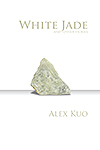book
White Jade and Other Stories
by Alex Kuo :: Wordcraft of Oregon, LLC :: Reviewed by Robert H. Abel

The seven stories in this collection are delightful. Sometimes funny and even perverse, they show an extravagant imagination, and a very sharp political perspective deepened by their concern for how wars and historical dislocations jam people into corners from which it sometimes takes generations to escape. The novella which follows them, White Jade, has a distinctly different tone and is a marvelous adventure in "autobiography."It is more like a channeling or act of loving reconstitution of a deceased mother's voice than anything like a memoir or confession or any of those other autobiographical modes which flaunt the author's ego.
Two of the stories, Chink Food and The Rockets' Red Glare feature a pair of very likable young semi-rogues trying to reinvent themselves in the western United States. One is Wing Moon, grandson the owner of the Golden Dragon Chinese Restaurant in Pendleton, Oregon; the other is Junior, an Umatilla Indian and veteran of Afghanistan military duties, now working as a sous-chef for Wing Fee, Moon's grandfather. Moon, a communications major, finds he is unable to take on jobs in advertising or public relations because they require him to "tell the best lies."Junior, though contented as a cook, is tired of playing the servant to the hunters and townsfolk who come into the Golden Dragon, mainly men who were once his teammates and classmates, but who now insult him with superior airs. This sets the pair to scheming, and without spoiling the stories, I will only say that old Wing Fee's family connections lead Moon and Junior into the fireworks business.
The most impressive story, in my view, is Regrets Only. In this tale, we find ourselves with Seymour inside the surveillance aircraft which, as news junkies will recall, was knocked out of the sky and onto China's Hainan Island in March, 2001. The details of this encounter are scintillating, vivid, frightening. After an emergency landing, Seymour and his crew mates are incarcerated, interviewed, and basically left to stew and ponder their futures. The irony of Seymour's being of Chinese heritage in an American plane whose mission is to spy on the Chinese is not lost on his captors, but that doesn't cut Seymour any slack, either. As the incarceration wears on, Seymour and an ally, Ford, find themselves alienated from the "displays of religious fervor"which "infect"the rest of their fellow captives. The end of the story, when the airmen-spies return to the United States, is rich with the absurdities and ironies of world politics.
Perhaps the most humorous story in the collection is Lunch. In this tale, two Chinese-American half-sisters learn the hard way how their mother/step-mother has so successfully manipulated them into maintaining her favorite vice—gambling. The oddest story, in my view, is 10,000 Dildoes. The main character is Fang Lizhi, whom news junkies will again recall was the Chinese astrophysicist who took refuge in the American Embassy in Beijing at the time of the 1989 demonstrations on Tiananmen Square. Out of the blue, six boxes of dildoes arrive from China at his post office box. Speculation on how this mysterious event could have occurred provides both the humor and the punch for this tale.
Two other stories round out the collection. Subsistence is something of a meditation on hunting in the modern world, but also, possibly, a response to another memorable news story involving an apparent encounter in Wisconsin between a Chinese-American hunter and racist whites. Free Kick pits a Minister of Natural Resources and Environment ("a quick blonde with double lined lips, someone misplaced in time or location, or worse”) against Cinch and Quatar, who are determined to keep a park under local control rather than let it fall into the hands of the "Shrub"administration. The outcome is decided by a soccer match. These stories, like the rest in the volume, are notable for the speed with which we get to know the characters and for both the efficiency and beauty of the prose.
White Jade, the novella in this collection, is worthy of a separate review. All of Kuo's themes come together here—the necessity and trickiness of language, the importance of managing or repossessing one's own stories, the difficulty of finding a self in a world of possibilities and dislocations of all kinds, the struggle to make sense of history, to name a few. This novella adds an important dimension: the idea that "it takes more than one person to write an autobiography, that for an autobiography to have any authenticity and hence value, it must extend beyond just one generation."
Alex Kuo is a professor of English at Washington State University. He received the American Book Award in 2002 for Lipstick and Other Stories, and is currently the Spring 2009 term distinguished writer in residence at Knox College in Galesburg, Illinois.
Robert Abel is a fiction and freelance writer living in Hadley, Massachusetts. He is the winner of the Flannery O'Connor Award for Short Fiction and holds an MFA in English from the University of Massachusetts.